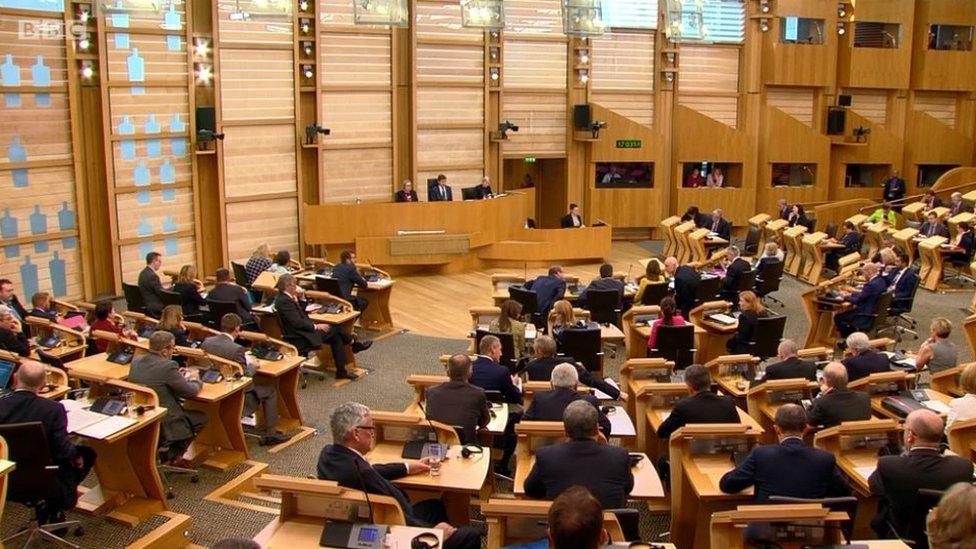What next for P1 assessments?
- Published

Opposition parties united to defeat the government at Holyrood
And so defeat at Holyrood tonight for the Scottish government. On what? On the system of nationally standardised assessments for P1 pupils.
This issue has gained quite remarkable salience in the past few weeks, leading to tonight's vote when ministers were defeated by 63 votes to 61.
Opposition parties say that is because of the significance of the issue - the education of our youngest children. They say the present system is flawed, generating limited information while stressing pupils.
Ministers detect another reason. They say the opposition parties - and particularly the Tories - saw a way to inflict defeat upon the government. And they chose that ahead of educational concerns.
The debate, mostly, veered between those two perspectives. For example, John Swinney, the Education Secretary, took pains to talk about the core of the issue; the international expertise which had suggested that Scottish pupils were not being assessed in a sufficiently systematic fashion.
But Mr Swinney also took a political tack. He accused the Tories of opportunism in U-turning from their previous support for standardised assessments, including at P1.
And he accused them further of "deceit" in suggesting, relatively recently, that they had never supported P1 assessments.
That attack led to angry exchanges with Murdo Fraser on the Tory benches. Mr Swinney called his opponent's speech "hysterical". Mr Fraser said the language deployed by the minister suggested that he had lost the argument.
Liz Smith led the debate for the Conservatives
Intriguingly, the opening case advanced by Liz Smith, the Tories spokesperson on education, was much more moderate and contained. She talked of the problems which had arisen in the system - rather than deploying a more fundamental attack upon the theory of standardised assessment.
This undoubtedly reflected the fact that her party contained support for just such assessments, including for P1, in their 2016 manifesto.
The Tory argument is that they changed their minds in line with emerging evidence. They were responding, they said, to the facts of the matter.
One senior Nationalist voiced an opinion to me on that argument. "Baloney", he said, adding other, even more discourteous remarks.
Labour's Iain Gray - a former teacher - spoke well. He cited concerns voiced by the EIS, noting that there was anxiety about standardised assessment at all levels but especially at P1.
Ross Greer for the Greens and Tavish Scott for the Liberal Democrats both delivered speeches which contained thoughtful analysis of the underlying problems with school assessment, as they saw them.
John Swinney says he will now "reflect" on the vote - but will he abandon the assessments entirely?
So what happens now? As explained here yesterday, the vote is not binding. It was not legislative so it does not change the law.
But, in a point of order, Labour's Richard Leonard challenged ministers to obey the will of parliament. And Tavish Scott of the Lib Dems found a neat formula when he said that a child could work out that 63 is a bigger number than 61.
But Mr Swinney is not, currently, for budging. He has promised to review the situation and to reflect upon the vote. Meanwhile he urged councils to continue with standardised testing, including at P1 level.
My take? He'll come back with further suggested reforms - including, perhaps, revisions to the questions and methodology in an effort to address, again, concerns that the system is stressful.
But, as things stand tonight, I do not see him abandoning the P1 assessments entirely. Which will generate a further debate about educational provision. And also about Parliamentary democracy.
- Published19 September 2018